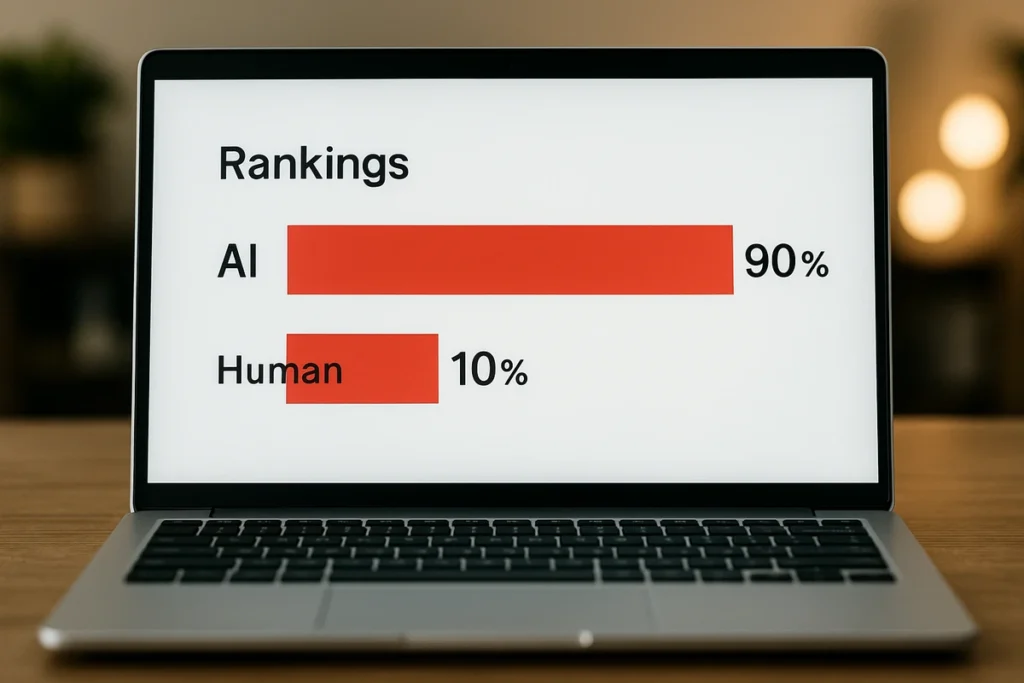Thursday
9 OctThe Hidden SEO Value of Author Pages and E-E-A-T Signals
The rules of search engine optimization have changed, and most content creators haven’t noticed. You can stuff keywords and build backlinks all day, but search engines now care more about who’s actually writing your content than how many times you mention your target phrase.
The websites dominating search results are proving their expertise, authoritativeness, and trustworthiness through detailed author pages. So, when you feature real authors with verifiable credentials, you’re giving search engines the trust signals they need to boost your search rankings.
Right now, the approach to e-e-a-t signals is one of the most underrated strategies in SEO, which is why this blog will show you the real value of SEO e-e-a-t signals and why Google has shifted its focus on author authority to rank high-value websites.
Understanding SEO E-E-A-T Signals
Nowadays, Google’s quality raters spend more time evaluating the person behind the content than the content itself. The search engine uses four specific factors to determine whether your content deserves higher search engine rankings.

Here are the four pillars that decide which web pages get traffic:
- Experience: Has the author actually done what they’re writing about? Search engines want proof of hands-on knowledge, not just research from other sources.
- Expertise: Does the person have relevant credentials or recognized knowledge in this field? Your content creators need demonstrable skills that readers can verify.
- Authoritativeness: Do other experts in the industry recognize this author as reliable? External links and mentions from authoritative sources help Google determine credibility.
- Trustworthiness: Can readers verify the author’s claims and background? This includes everything from professional profiles to online reviews and third-party validation.
When you create content without addressing these e-e-a-t factors, you’re asking search engines to trust anonymous information. And the algorithm can’t evaluate what it can’t verify.
How Author Pages Boost Domain Authority
Creating high-quality backlinks is a thing of the past. Now your domain authority is increasingly tied to the credibility of the people creating content on your site.
Search engines have gotten smarter about evaluating content quality. They’re looking at who’s behind the keyboard. When you build comprehensive author profiles that showcase credentials, experience, expertise, authoritativeness, and trustworthiness, you’re giving search engines the context they need to understand why your content deserves higher visibility in search results.
Most websites publish valuable content from knowledgeable content creators, but never show search engines who these people are. This keeps their domain authority low, while competitors with clear author pages climb the rankings.
What happens when you add author pages?
Google’s algorithm treats content differently when it can verify the person behind it. A single blog post from a recognized expert with a detailed author bio carries more weight than ten anonymous articles covering the same topic.
How to Build Experience, Expertise, and Authoritativeness
You know your authors have the knowledge. Now you need to prove it to search engines in ways they can actually measure and verify.

Content creators need to demonstrate their hands-on experience with specific examples and real results. Search engines look for this proof when they measure whether the content created deserves higher search engine rankings.
This is how you build e-e-a-t for your website:
Showcase Real-World Experience
Include specific examples from your author’s work history. Case studies, project outcomes, and measurable results give search engines something concrete to evaluate.
Your author bio should mention years of experience, but the content itself should reference actual situations they’ve handled.
Establish Recognized Expertise
List relevant certifications, education, and professional achievements that readers can verify. External links to professional profiles help Google search confirm these credentials. Professional association memberships and industry recognition also add another layer of credibility.
Build Long-term Authoritativeness
You or your content creators should regularly publish high-quality content in their niche while engaging with industry discussions.
Getting mentioned by other authoritative sources and earning speaking opportunities also helps build the kind of reputation that search engines notice.
Human vs AI-Generated Content
Now that you know the value of the e-e-a-t approach, let’s address the elephant in the room: artificial intelligence. The difference between human-authored and AI-generated content is a huge factor in how search engines evaluate content quality.

As the algorithm starts spotting the patterns, you need to know how to tell the difference, too.
| Human-Created Content | AI-Generated Content |
| Personal experience and insights | Generic information compilation |
| Verifiable author credentials | No clear authorship |
| Unique perspectives and opinions | Predictable, template-driven patterns |
| Natural writing variations | Detectable AI writing patterns |
| References to specific situations | Broad generalizations |
When content creators write from their own experience, they include details that AI systems can’t replicate. They reference specific situations, share personal insights, and make connections that only come from actually doing the work.
The websites winning in organic traffic are providing the kind of authentic value that readers actually want to share and link to. It’s also rewarded because this type of genuineness helps readers solve real problems.
6 Step Guide to Implementing Strategic E-E-A-T
The theory sounds good, but putting e-e-a-t signals into practice requires some strategy. We worked with clients who added author pages as an afterthought, and wondered why their search engine rankings didn’t improve.
We’ve created a foolproof approach to this strategy, so follow our step-by-step guide below to get actual results:
- Step 1: Audit your existing content created without clear authorship. We recommend looking for high-performing articles that need author attribution and credentials.
- Step 2: Create detailed author bio pages with credentials, experience, and professional background. Include links to external profiles and certifications that search engines can verify.
- Step 3: Add author bylines to all relevant content with direct links to these bio pages. We noticed that this connection helps Google determine the expertise behind each piece of valuable content.
- Step 4: Include author schema markup so search engines can easily identify and process your E-E-A-T signals in their algorithms.
- Step 5: Encourage your content creators to engage with online reviews and industry discussions. The external recognition from this can strengthen overall authority.
- Step 6: Make connections between author profiles and professional platforms like LinkedIn or industry associations.
After years of working with multiple websites, we’ve seen search results improve most dramatically when sites complete all six steps rather than cherry-picking individual elements. The ones that implemented this comprehensive SEO strategy found measurable improvements in organic traffic within three to six months.
Your Next Steps for E-E-A-T Success
The hidden value of author pages isn’t actually hidden anymore. It’s right there in Google e-e-a-t guidelines and the success stories of websites that have taken on content marketing that is driven by expertise.
Your competitors are still chasing algorithm updates and keyword density, while you now have the blueprint for building search engine optimization that creates lasting results.
Ready to implement these e-e-a-t strategies on your website? Visit H-MAG.com for more actionable SEO insights to build the kind of search engine rankings that truly drive results!
Frequently Asked Questions (FAQs)
Q: How quickly do e-a-t signals impact search engine rankings?
A. E-E-A-T is a long-term ranking factor that builds over time. Most websites see gradual improvements in search rankings over 3-6 months as search engines recognize and validate your expertise signals.
Q: Do I need separate author pages for every content creator?
A: Yes. Each person creating content should have their own detailed bio page showcasing their relevant credentials and experience in your niche.
Q: What’s the difference between E-A-T and E-E-A-T?
A: Google added “Experience” to emphasize first-hand knowledge and practical application. E E A T is now the standard framework that search engines use to evaluate whether content creators actually know what they’re writing about.




